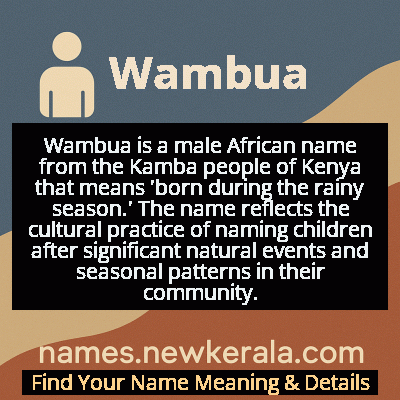Wambua Name Meaning & Details
Origin, Popularity, Numerology Analysis & Name Meaning of Wambua
Discover the origin, meaning, and cultural significance of the name WAMBUA. Delve into its historical roots and explore the lasting impact it has had on communities and traditions.
Name
Wambua
Gender
Male
Origin
African
Lucky Number
7
Meaning of the Name - Wambua
Wambua is a male African name from the Kamba people of Kenya that means 'born during the rainy season.' The name reflects the cultural practice of naming children after significant natural events and seasonal patterns in their community.
Wambua - Complete Numerology Analysis
Your Numerology Number
Based on Pythagorean Numerology System
Ruling Planet
Neptune (Ketu)
Positive Nature
Intuitive, analytical, spiritual, and inquisitive.
Negative Traits
Secretive, reserved, aloof, and can be overly critical.
Lucky Colours
Green, yellow.
Lucky Days
Monday.
Lucky Stones
Cat’s eye, moonstone.
Harmony Numbers
1, 5, 6.
Best Suited Professions
Scientists, researchers, spiritual leaders, detectives.
What People Like About You
Depth of knowledge, analytical skills, spirituality.
Famous People Named Wambua
Wambua Musyimi
Politician
Member of Parliament in Kenya and advocate for community development
Wambua Kilonzo
Legal Scholar
Renowned Kenyan constitutional lawyer and human rights advocate
Wambua Nzioka
Community Leader
Influential elder and cultural preservationist in Ukambani region
Name Variations & International Equivalents
Click on blue names to explore their detailed meanings. Gray names with will be available soon.
Cultural & Historical Significance
The name also reflects the Kamba people's spiritual connection to nature and their belief in the interconnectedness of human existence with natural cycles. In Kamba cosmology, rainfall is often associated with divine blessing and ancestral favor, making a child born during this period particularly special. The name Wambua thus carries not just temporal information but spiritual significance, positioning the child as someone welcomed by both the community and the natural world. This cultural practice has been preserved through generations, maintaining its relevance even as modernization transforms other aspects of Kamba society.
Extended Personality Analysis
Individuals named Wambua are typically associated with characteristics that mirror the qualities of the rainy season they're named after. They often exhibit a nurturing and supportive nature, much like rain that nourishes the earth, showing genuine care for the growth and wellbeing of those around them. Wambuas are frequently described as grounded, practical, and resilient—able to weather life's challenges with the same steady persistence that characterizes seasonal rains. Their approach to relationships and responsibilities tends to be consistent and reliable, earning them trust and respect within their communities.
Beyond these foundational traits, Wambuas often demonstrate a deep connection to tradition and family, valuing their cultural heritage while adapting to contemporary circumstances. They typically possess a reflective quality, considering situations thoroughly before acting, much like the anticipation that builds before rainfall. Many develop strong leadership qualities, particularly in community-oriented roles where their natural inclination toward nurturing and sustaining others shines. Their personality often blends quiet strength with emotional intelligence, making them effective mediators and trusted advisors in both personal and professional contexts.
Modern Usage & Popularity
In modern times, Wambua maintains its cultural relevance while adapting to contemporary naming practices. Among urban Kamba families, the name continues to be used as a meaningful connection to cultural heritage, though sometimes as a middle name rather than a first name. The name's usage has remained relatively stable rather than experiencing dramatic popularity fluctuations, reflecting its status as a traditional choice rather than a fashionable one. Interestingly, as global awareness of African names grows, Wambua has gained some recognition beyond the Kamba community as an example of culturally significant African naming traditions. However, its primary usage remains within Kamba families in Kenya and the diaspora, where it serves as an important marker of ethnic identity and cultural continuity in an increasingly globalized world.
Symbolic & Spiritual Meanings
Symbolically, Wambua represents the profound connection between human life and natural cycles, embodying concepts of renewal, provision, and perfect timing. The name metaphorically suggests that each person arrives precisely when needed, much like rainfall that comes to relieve drought and enable growth. It symbolizes the idea of divine orchestration in human affairs, where challenging periods naturally give way to seasons of abundance and opportunity. Wambua also represents the concept of community interdependence—just as rain benefits the entire ecosystem, individuals bearing this name are often seen as having a role in nurturing and sustaining their communities. The name carries deeper philosophical meanings about patience, trust in natural processes, and the understanding that all things have their appointed time for fulfillment and manifestation.

